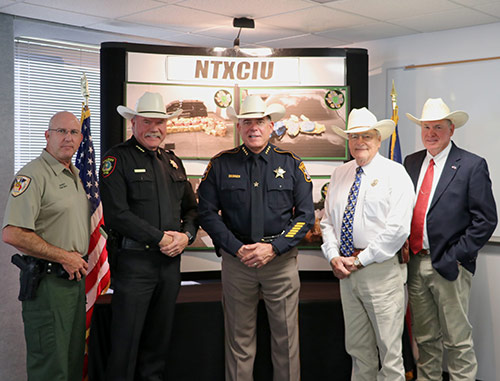Contact Us
To provide feedback on the Community Policing Dispatch, e-mail the editorial board at CPDispatch@usdoj.gov.
To obtain details on COPS Office programs, publications, and resources, contact the COPS Office Response Center at 800-421-6770 or AskCopsRC@usdoj.gov

U.S. Department of Justice
Office of Community Oriented Policing Services
Washington, DC 20530

It started as a routine traffic stop in December 2017. A Rockwall County (Texas) sheriff’s deputy pulled over a car with a faded paper license plate on a remote stretch of North Texas highway. But the incident soon became far from routine. A search of the vehicle found seven pounds of methamphetamine, heroin, and fentanyl. What’s more, one of the three occupants was a murder suspect with a warrant for his arrest, and the car contained three illegal weapons including a fully automatic Glock 19, all within easy reach.
Eight counties created one formidable enforcement unit
Had there not been immediate backup from two neighboring jurisdictions, this intervention could easily have turned deadly. However, the deputy who initiated the stop worked for one of the eight counties that have banded together to create the North Texas Criminal Interdiction Unit (NTXCIU), a mutual aid task force that has greatly increased the response time and enforcement power of each participating county.
Launched shortly before the traffic stop described earlier by the sheriffs of Collin, Grayson, Hunt, Parker, Rockwall, Smith, Tarrant, and Wise counties, the NTXCIU was created to stop the growing problem of drug and human trafficking on their highways. And according to Nick Bristow, Public Information Officer for the Collin County Sheriff’s Office, it has exceeded expectations.
$18 Million in illegal drugs, two murder suspects, and two abducted children
In the 10 months since its formation, the unit has intercepted $668,632 in U.S. currency, four automatic weapons, 20 stolen vehicles, 103 pounds of cocaine, 105 pounds of heroin, and more than 1,000 pounds of other drugs with a total street value of $18.8 million. Deputy sheriffs from the NTXCIU have also arrested 114 persons—including two capital-murder fugitives—and recovered two abducted children.
The first unit of its kind in the United States, the NTXCIU got off the ground when the participating sheriffs enlisted the support of county judges and their commissioner courts, who signed agreements allowing deputy sheriffs to conduct investigations and enforce the law across county lines.
Interoperability with a high degree of flexibility but clearly defined roles
Today, the unit consists of 10 specially trained highway patrol deputies authorized to make arrests in any of the participating counties. They wear the same uniform, drive similarly marked cars, and are supported by many of the same professionals, including dispatchers and analysts. But despite the high degree of cooperation, there is also a high degree of operational flexibility.
The deputies are free to make their own decisions about coordinating joint efforts, and interdiction officers from two or more counties can meet to work a stretch of highway in any member county. However, deputies from the host county—where the operation, arrest, or seizure occurs—are usually responsible for taking custody of arrestees, property, or seized vehicles. The host county also controls dispatch.
Heading the eight NTXCIU agencies are:
- Collin County Sheriff Jim Skinner
- Grayson County Sheriff Tom Watt
- Hunt County Sheriff Randy Meeks
- Parker County Sheriff Larry Fowler
- Rockwall County Sheriff Harold Eavenson
- Smith County Sheriff Larry Smith
- Tarrant County Sheriff Bill Waybourn
- Wise County Sheriff Lane Akin.
Moreover, every deputy must comply with his or her own office’s policies—as well as the host county’s policies—especially those that deal with vehicle stops, searches, arrests, and the use of force. Each county also retains primary financial and other responsibility for its deputies, employees, vehicles, and other property. Radio interoperability, federal detainer requests, forfeiture cases, citations in lieu of arrest, video and audio recordings, and record keeping are also addressed by the NTXCIU’s mutual aid agreement.
A strong and effective force multiplier
Says Sheriff Jim Skinner of Collin County, “Setting up the unit took time—there are many moving parts—but the results were far more than worth it. We’re disrupting the drug and money supply chains, and the community’s response to the increased safety has been outstanding.” Noting that the right kind of mutual aid force helps sheriffs improve public safety without significant personnel changes or great cost, Grayson County Sheriff Tom Watt said that it’s a good, strong force multiplier. Added Bristow, “By working together, we can not only make Texas safer but also the nation as a whole. Reducing the illegal drug supply and human trafficking benefits us all.”
To learn more about collaborative efforts in law enforcement, see the following:
- The Collaboration Toolkit for Law Enforcement: Effective Strategies to Partner with the Community
- Operation Partnership: Trends and Practices in Law Enforcement and Private Security Collaboration
- The COPS Collaboration Toolkit: How to Build, Fix, and Sustain Productive Partnerships
- The Collaboration Toolkit for Community Organizations
- The Methamphetamine Summit: A Process in Collaboration and Decision Making
Faye C. Elkins, Sr. Technical Writer
COPS Office
Subscribe to Email Updates
To sign up for monthly updates or to access your subscriber preferences, please enter your email address in the Subscribe box.






